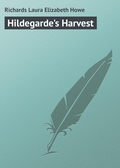
Laura Richards
Isla Heron
CHAPTER V.
“LONE, LONE, THOU HAST LEFT ME HERE.”
HERE begins the true story of Isla Heron’s life. She had been a simple creature till now, living the life of half-savage freedom that was the only life she knew, playing among the black rocks, singing with the wind and the sea, loving her parents and her little Jacob almost fiercely. Her thinking life began when her father was brought back to the home-cabin, cold and silent, and laid on his bed by the pitying villagers. One man came first, bringing the bad news; it was Joe Brazybone. He had been hovering about in his boat, as he often did, fishing now and then, but keeping an eye on Giles; had not dared to follow him up the rocks, for Giles had been strange for a long time now, and had kept off the old friend; but after a time Joe grew alarmed, and climbed up, and found him already cold. He came now, and tried in some awkward fashion to break the news. Isla took little note of the strange figure at the time, though she knew it well enough afterward.
“Giles ain’t very well,” said Joe, edging round the corner of the house.
“You tell your ma that, little Heron lady, and I’ll keep out o’ sight, for she don’t like old Joe, your ma don’t. You tell her Giles ain’t very well. And – see here, little lady! When you’ve a-told her that, foller it up, you know! foller it up! tell her he’s bad, and then, kind o’ easy, tell her he’s mortal bad, and they’re fetchin’ of him home.”
Here he broke off short, with a glance behind him; and thrusting the child gently forward, with an earnest gesture, he slunk out of sight as Mary Heron came to the door. Next moment the men were there.
They spoke in whispers, and cast strange glances at the dumb woman, with her gray face and wild eyes of pain. There was no surprise for her; it was only the Thing that lurked so long in corners of her hut, now come out into the light and known for what it was. A kind, white-haired fisherman stayed behind the rest, who were in haste to be gone; he spoke gently to Isla, and she interpreted his words to her mother. There was no minister on the island at that time, but Captain Maynard was used to filling the place of one, and the simple arrangements were made for saying a prayer and laying the tired body to rest.
When the stranger was gone, Isla went to the bed and put her face down by her father’s. She called him, putting forth all the power of her strong young voice; it seemed as if he must hear her. But he gave no sign, and the lids lay white and heavy over his eyes, and when she touched his cheek it was cold, cold. She looked at little Jacob, playing with his shells on the floor; then at her mother. But there was no mother now, only the wife who had seen her child loved better than herself, and who would now guard her sorrow jealously, admitting no sharer in it; and Isla knew that she was alone.
She made no resistance when, after days of brooding, the dumb woman took her by the hand and led her over the rocks, across the brown hill-pastures, to the village school. A little gray building stood apart on a stony hill, and here the children were taught by a young woman who came over from the main for certain months of the year.
Standing in the doorway, Mary Heron beckoned to the school-mistress, who came trembling, afraid of the tall, gipsy figure and the burning eyes; laid the child’s hand in hers, and, with a gesture of grave dignity, turned away. Isla, standing with her hand still in the teacher’s, watched the stately woman as she took her way down the hill and back through the crooked street; her heart yearned to her mother, but Mary Heron never looked back, and soon passed out of sight.
The young teacher was kind, and her fear of the wild girl soon wore away when she found her readiness to learn. Isla pounced upon the simple school-books and studied them fiercely. The children kept their dread of her longer, and huddled together in the play-hour, looking askance at her long russet locks, like tawny rockweed, and her dusky, jewel-like eyes. She had no beauty according to their standard (which was pink and white, and had yellow curls), but all the remoteness of her sea-bound home was in her face and look. Her dress was strange, too, for the homely brown print was sure to be looped and decked with fringes of kelp and weed, and she had long strings of shells, sometimes bound round her head, sometimes twined about her wrists.
Soon, however, the children learned to love her, for her heart was gentle, and she loved all little creatures. She brought them sea-urchin shells, delicately cleaned, and showing all their beauty of green and pale purple; chains of gold-shells, or of dried sea-bladders. The children took the gifts eagerly, and at length grew familiar, and questioned Isla about her life at the south end of the island.
“What makes you live there, Isla? Why don’t you never come up to the street, and live in a house like other folks? My mother says decent folks wouldn’t live there in those bogy rocks. What makes you stay there?”
Then Isla would throw her head back, and draw a long breath as she looked about her at the bare, dingy walls of the little schoolroom.
“It isn’t living, here!” she would say. “It’s – I don’t know what it is! there’s no air to breathe. Where I live, the wind blows in from the sea, and it comes from all across the world; and I don’t have to be under a roof, – I hate roofs, – only just at night and in the winter; and I have the rocks, and the sheep, and my little Jacob, and all the things in the woods. Don’t you go in the woods? But what makes you live here, in these houses all near each other? That’s the strange way, not mine; mine is the real way. What makes you do it?”
“’Cause it’s near the boats!” said one.
“’Cause the school’s here, and the store!” said another.
“’Cause there’s folks, and folks like to be where there’s other folks!” said a third; and the rest chimed in, as this sentiment voiced the feelings of all.
“Yes, folks like to be where there’s other folks.”
Then Isla would shake her long locks, and laugh, and begin to sing one of her strange songs, or tell them of the wonderful things in her home, which stretched miles and miles, all her own, all a playground for her and Jacob.
So things went on well enough for a time; but one day Isla took some of the children off, at their urgent request, and kept them a day and a night in some familiar haunt of hers among the hills. Their parents were frantic, and searching parties were sent out in all directions. The dumb woman could or would tell them nothing; she only shrugged her shoulders, and showed them that her own little boy was gone with his sister and the rest. They were ready to burn her cabin over her head, when down the hill came Isla singing, a child in either hand, another leaping and singing beside her. She was seized, threatened with punishment, and warned never to come to the school again.
The little teacher sighed for her best scholar, the only one who had made teaching anything but drudgery; the children looked longingly for the wild girl who spoke so kindly, and sang so sweetly, and told them such beautiful stories; but Isla came no more. Only the boldest of the children, venturing rarely a little way down the beach toward the south end, would hear her song, echoing clear and sweet among the Wild Rocks.
ISLA’S SONG
The wind sang to the falling tide,
“Coo sha coo! coo sha coo!
Now I fold my wings wide,
Coo sha coo sha coo!
Sleep beneath the folded wing,
Dream and murmur while I sing,
Coo sha coo sha coo sha!
Coo sha coo sha coo!”
The wind sang to the rising sea,
“U la hu! u la hu!
Come and fly abroad with me,
U la hu la hu!
Toss your hair so wild and gray,
Beat the rocks with hands of spray,
U la hu la hu la!
U la hu la hu!”
CHAPTER VI.
THE NEW TEACHING
AND now, this Sunday morning, Isla stood on the rocks, and looked at the young preacher, as she came toward her.
“Good morning!” said the preacher, feeling curiously embarrassed under the quiet, straightforward gaze of the island girl. “I saw you at the service this morning; but I missed you when it was over, and your friend here guided me to you.” She turned to look at Joe, but he had disappeared.
“Yes,” said Isla Heron, “I was there. I was coming to look for you, too. I wanted to ask you if something you said was true.”
The preacher smiled. “I hope I said nothing that was untrue,” she said.
Isla looked up with a startled glance. “Oh, yes!” she said. “Things that are not true here, anyhow. I don’t know how it may be over on the main. But – what I wanted to ask you – you read something from the Bible, – ‘The tongue of the dumb shall sing.’ What did you mean by that?”
The preacher repeated, slowly, that she might have time to think a little.
“‘Then shall the lame man leap as a hart, and the tongue of the dumb sing.’ Yes, that is a beautiful passage; you will find it in Isaiah, the thirty-fifth chapter.”
“But is it true?” Isla persisted. “Did they do it then, or can they do it now?”
“I do not understand you,” the preacher said, gently. “It is a prophecy of the flourishing of Christ’s kingdom.”
“Will he make dumb people speak? that is all I want to know,” said Isla. “My little brother is dumb, and I would do anything in the world to make him speak. If that is true, tell me how it is done.”
The preacher looked at her very tenderly.
“Let us sit down here, my dear,” she said; “and tell me about your little brother.”
They sat down on a warm brown stone, and Isla told the story of her little Jacob; of her father’s death two years before, and of her mother’s fading away through the year, and following him before another spring came.
“So now there are just the two of us,” she said. “Just me and my little Jacob. And if I could make him hear and speak, I would be willing to die myself.”
“He can never hear!” the preacher said. “These are not the days of miracles, and we have no assurance that we may look for them, though signs and wonders are all about us. But truly a wonder has been wrought in these very days; and it may be that the child can be taught to speak, and to read by the lips what others say to him.”
She told Isla, in a few words, of the new teaching of the deaf, and the girl listened with her whole soul.
“Where is it done?” she asked. “Tell me the name of the place!”
The preacher named Bellton as the nearest city where such teaching could be had. “Have you friends there?” she asked.
Isla’s startled eyes gave her answer. “Bellton!” she said. “That was a place Giles showed me on the sand, where the people lived in prisons, and liked it, and turned white for want of sun. I should have to go there, should I, and take my little Jacob? Could a person live there, do you think, who was not used to it?”
“I was there for two or three years,” said the preacher. “I lived well enough, Isla. Have you never been away from your island?”
The girl shook her head.
“No! why should I go? I never would go, except to help my little Jacob. It would kill me to live under a roof, and breathe hot air, and have no wind blowing, and no sea.”
“Where do you live?” asked the preacher. “You cannot spend the year out-of-doors, in this cold place.”
“Come and see!” said Isla Heron.
She led the preacher over the gray rocks, over the high downs, till they came to the little green meadow, set like a jewel in a great ring of stones.
Here was the cabin, looking from the outside not unlike the rock against which it leaned. Inside, it was gay with shells and bright berries, and everything was neat and clean, as Mary Heron had taught her children to keep it. Jacob was sitting by the table, carving a boat, and at Isla’s coming he rose, clapping his hands, and ran to throw his arms round her neck; but drew back in alarm at sight of the stranger. The girl spoke to him with eyes and hands, and led him forward, still hanging back, but smiling now, and ready to make friends. He was nearly ten years old, but so small and delicate that he looked much younger. His face was all sunshine, but there was no line of thought in it yet; he had never had to think for himself. Isla had done all his thinking, and he had lived like a bird so far, taking everything at her hands, rejoicing in the sunshine, and the sea, and the shells and flowers. He knew nothing beyond his own end of the island. Isla was a great traveller in his eyes, because she sometimes went to the village, and was gone for hours. This never made him sad, because he did not know what sadness was; but he had a pride in his sister’s journeyings, and looked eagerly in her face when she came back, seeking new light there, since she was so wise always, and probably learned new wisdom every time she went away.
The preacher caressed the child, and sat for a few moments in the little sitting-room, her mind full of new thoughts.
“You live here entirely alone?” she asked, presently; “you two children? Are you happy, Isla? Is it not terribly lonely?”
Isla looked up wondering.
“How should it be lonely?” she said. “It is home. It is the only place where we could live. Some people wanted us to come and live in the village, after mother died. We’d sooner have died, too, both of us. Wouldn’t we, Jacob?”
“Is there no one belonging to you? it seems too – ”
“Too dreadful,” the preacher would have said, but something seemed to hold back the words. Perhaps it was the perfect quiet in the two faces.
“Of course I miss Giles, all the time,” Isla went on, presently. “But he was so tired, poor dear, that he could not stay any longer.”
“And your mother?” said the preacher, with some reproach in her tone. “Do you not miss your mother?”
“Jacob did!” said Isla. “Or he would have, at first, if I had let him. But mother, – oh, you could not have kept her. She hated it so, after Giles was gone, she had to go, too. No, we are much better off without mother; she could not bear me after Giles went, and hardly she could bear Jacob; and she tried so hard to die, I was glad when she could. She was dumb, too, you know, and now she isn’t, I suppose.”
This was strange talk. The preacher felt that she should reprove and exhort, but still the girl’s face silenced her.
“Tell me, Isla,” she said, after a silence, “what did you mean, when you said, a little while ago, that I had said some things that were not true. You did not mean that, I am sure.”
Isla reflected.
“Oh, yes,” she said. “Oh, surely I meant it. You spoke of Him,” – she nodded upward with her curious reverent gesture, – “you said He was our Father; I liked that. Giles knew a little, but he did not know that much, then. Now I suppose he does. But then you said that if we did things, – I don’t remember what things, – that He would be angry with us always, and never love us any more, and that we should be punished all the time, forever. And that could not be true, because it is nonsense.”
The preacher was startled, and spoke sharply.
“You are not speaking in a proper manner!” she said. “What right have you to speak so to me?”
“You asked me!” said Isla. “What did you want me to say?”
They were both silent for a time.
“Why do you think this?” said the preacher then. “What can you know about these things, living here with no teaching and no light save that of your own heart, which is sinful?”
Isla laughed.
“I had a father!” she said. “Do you suppose that Great One needed Giles to tell Him how to treat His children?”
“What can I know?” she repeated. “I know what the sea tells me all day, all my life; and what the clouds tell me, and the birds; but most of all I know what my little Jacob tells me. Look at him! Is he sinful? If you say that, then I see that you do not know. But my sea knows, and it tells me, all day long. All day long!” the girl repeated; and her eyes grew soft and dreamy as she gazed out over the blue, white-tossing water. The preacher would have answered, for she was shocked and pained at this unseemly talk; but suddenly some words came to her mind, and silenced her.
“Deep answereth unto deep – ”
“I must go!” she said, rising. “I should like to see you again, Isla, and talk with you; your – your thoughts are strange to me, but I feel that your heart is good. I must go now back to the village.” She kissed the little boy, who cooed and smiled in return, and turned to find her way back to the village; but Isla was at her side.
“Let me take you by a shorter way,” she said. “It is slow climbing over our rocks when folks are not used to them. I will take you through the Dead Valley, and you will get there quicker. But you will not tell people?” she said, stopping for a moment, and looking up into her companion’s face with searching eyes. “It is our own place, Jacob’s and mine; we don’t want other folks to know about it.”
The preacher promised.
“Shut your eyes, then!” cried the girl, her face lightening with pleasure. “Give me your hand, and I will lead you into our Dead Valley. Now! now open your eyes, and look!”
The preacher obeyed, and gave a cry of surprise, so strange a place was this that met her eyes. A valley of rocks; yes! but not rocks like those she had seen elsewhere, not like any rocks that she had seen in her life. A place of desolation, full of the bones of forgotten ages. The girl, watching her companion’s face, laughed aloud for pleasure.
“Do you see?” she cried. “Do you see why it is the Dead Valley? Look at them all, the great beasts, lying asleep! Giles told me all about them, when we first found this place; we came together, Giles and I. He said, ‘They are mammoths, like elephants, only bigger;’ and he had seen the bones of one, somewhere, in some place where they keep such things, so he knew their names and all. And see! They used to play here, and go down to the water to bathe, and just live as they liked. And one day, – we played they had done some dreadful thing, but we never knew just what, – they were all turned into gray stones, and here they have been ever since. There! that is one of the biggest; and he fell down on his side, you see, and just curled his great huge legs under him, and went to sleep so comfortable! And this one, – oh, I love this old fellow. He was kneeling, don’t you see, preacher? and he could not get up when the time came, so he went to sleep just that way. And down there by the beach, that one had gone down to drink and take his bath, and he tumbled in, and there he lies. Over the other side of him, that is where Jacob and I go to bathe ourselves. The rockweed grows all over his shoulders, and keeps him warm. And we run over his back, and sit on his great round head, and climb into a hollow place that we call his mouth; but he never stirs, just sleeps and sleeps; and there he will stay, Giles said, till the last call comes. What is the matter, preacher?”
The preacher had started with a little cry of dismay. Two or three aged trees, ragged and twisted and bent, still clung to the rocks in this grim place, and kept some sort of iron-bound life in their veins. There were many others lying beside them, which had given up the fight years, – centuries ago. Only their bones were left, gleaming pallid and slender among the sleeping mammoths; and soon these old soldiers, too, would lay down their arms and join the sleepers. But still there showed some faint tinge of green in their rusty tops; and, as the preacher looked at them, wondering, a great black bird rose from the ragged branches, and almost brushed past them in his flight.
Isla laughed again, and waved her hand with a friendly gesture.
“Those are our ravens,” she said. “They are friends of ours, Jacob’s and mine. Other folks are afraid of them, but we know them, and they like us. This way, preacher! Step up on this elephant’s shoulder; he will not hurt you. There! now it will be smoother; and tell me more about the place where they teach dumb people to speak.”







